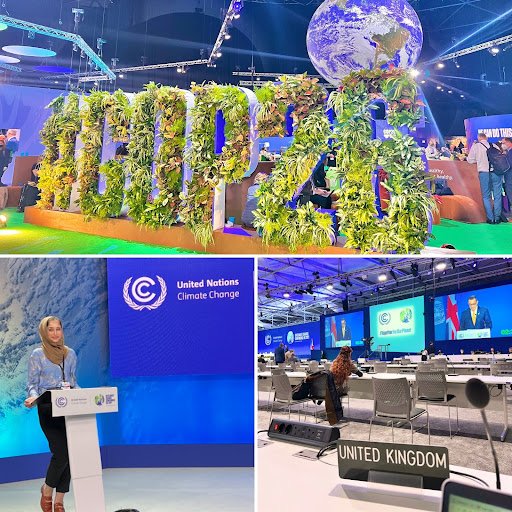A behind the scenes recap of COP26 by Sara Sajjad
/Working on COP26 was my first real, long-term job after graduating, and genuinely – I felt like I’d hit the career jackpot. I found myself based in a team sitting at a fascinating intersection between the UK Government, the world of the UN and the delivery of a high-profile political event involving 197 parties, and 120 World Leaders. Alongside my exceptionally talented colleagues (a separate jackpot), we drove forward international climate diplomacy. In practice - this meant that in the lead up to COP, we focused on securing ambitious national commitments from governments around the world on issues such as Net Zero, Fossil Fuel Phase-out, Zero Emission Vehicles, Nature, Climate Finance and UNFCCC Negotiations. And this November, after a surreal, adrenaline fuelled whirlwind of weeks spent in a conference centre in rainy Glasgow, negotiations drew to a close. COP26, the ‘defining’ climate summit of our generation, was finally over.
In the days after the conference, I refamiliarised myself with sleep, being able to go outside during daylight, using a kitchen after weeks of hotel restaurant food and having full conversations with family and friends that didn’t reference COP or climate. I also experienced a strange, eerie stillness wash over me in the absence of a high-pressure workload, an inbox and phone in overdrive with notifications, and the hectic, buzzing background noise of a conference which 38,000 delegates attended. I found myself obsessively scrolling through news articles and social media takes discussing whether COP26 was a success or a failure - flickering between bursting with an incredulous sense of pride and awe over what we had achieved, versus trying desperately to not feel personally attacked by the inevitable criticism scattered across opinion pieces voicing disappointment. What continued to strike me in all of the post-COP26 commentary was that I didn’t find myself in outright disagreement with either the triumphant praise or the frustrated outrage at the outcomes of COP. Whilst I haven’t quite figured out how to reconcile these two opposing narratives – I have come to the conclusion that they do not cancel each other out.
Two weeks in Glasgow was never going to fix the climate crisis, but this doesn’t discredit that COP26 made some tremendous, historic wins towards reducing and limiting global emissions and our reliance on fossil fuels. There were also pledges to mobilise hundreds of billions of dollars for climate finance, including doubling adaptation finance to support climate vulnerable communities. Additionally, there were pledges from countries home to more than 90% of the world’s forests to end and reverse forest loss and land degradation, and commitments from car manufacturers representing approximately a third of the global car market to end the sale of polluting vehicles. Progress was made in dialogues on the issue of loss and damage caused by climate disasters, and after six years, the outstanding rules governing the 2015 Paris Agreement were finally resolved, cementing our commitment to keep 1.5C degrees in reach. You can read the explainer on the full set of negotiated outcomes in this guide - I can tell you first-hand that these were hard won achievements. Still, disenchanted activists remind us that the pace of progress is alarmingly slow. Millions are already reckoning with detrimental impacts of climate disasters occurring right now. These critiques are valid, and in many ways crucial to keeping up pressure on governments to now honour the agreement reached at COP - which was never intended as an end in itself, but as a means to facilitate the necessary action.
To me, it felt as if there was a huge disconnect between the glamorous star-studded events and grandiose speeches that were showcased in the press (and admittedly, on my own Instagram stories), versus the frantic and hugely challenging work that happened ‘behind the scenes’, and underpins the announcement of each new commitment and an agreement being reached between 197 countries. The latter was what my experience of COP26 was centred around, and whilst sleep deprived officials, huddled around laptops and in consultations does not make for a good photo op - I feel lucky to have had the opportunity to work on something so meaningful and far reaching. I think that through pledges and commitments made at COP, parties showed that they’ve largely understood the assignment - they will have to undergo complex, systems-wide changes. This alone is cause for clinging on to hope, because whilst it doesn’t offer an instant catharsis to the climate emergency, it definitely brings us one step closer.

